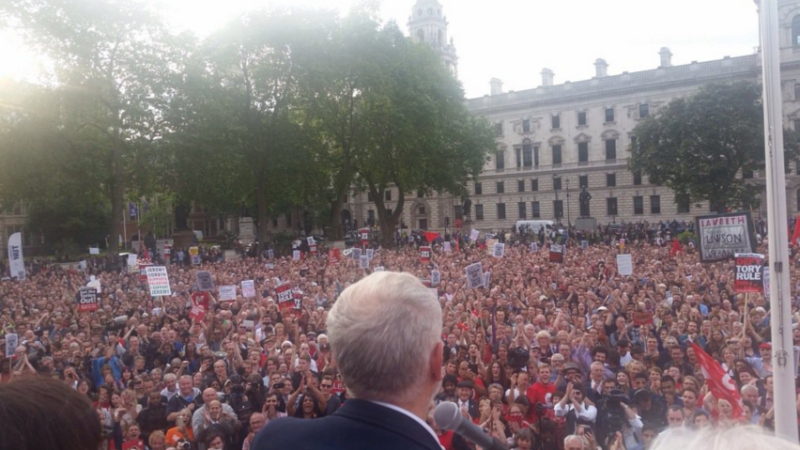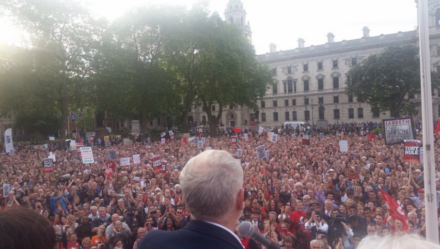

“Unity” has been the buzzword in the Labour Party since Jeremy Corbyn’s re-election last month. But how important is it?
Corbyn and his allies are right: divided parties do not win elections. If Corbyn loses in 2020, his backers are likely to argue that victory was impossible, given the opposition he has faced from his MPs.
Yet just because divided parties do not win elections, it does not logically follow that united ones do. Ed Miliband, for the most part, kept a lid on the bubbling resentments that might have led to division during his tenure. Now many in the party feel they bit their tongues in the name of unity only for Labour to fail at the ballot box anyway.
Those Miliband critics who feel the same about Jeremy will not be so hesitant again – but their dissent will cause little distress among the leadership. To go into an election on the platform he wants to run on, Corbyn is unlikely to win their support, and their public opposition will only serve to entrench the feeling of protectiveness from his core base.
What should cause concern for him is that cracks are beginning to show among his existing coalition of supporters.
While those accusing Corbyn’s backers of having a “messiah complex” are on shaky ground given, for example, what Labour’s ’97 manifesto looked like, there is a problem with the hostility directed from the leader’s firm allies towards those who wish to develop a more rigorous, constructively critical support for the Corbyn project.
We need there to be critical friends of the Labour leadership. This is something Corbyn himself sometimes seems to understand. Right from the beginning of his leadership bid last year he promoted a more discursive politics, one that encouraged comradely debate about the big issues, rather than dictats from up high. A central theme of his candidacy was about “changing the conversation”.
Of course, some people will look for any reason to criticise Corbyn, and it is not worth pretending that this is not the case. There also exists an overwhelming scepticism of Corbyn within the media, and that absolutely does lead to unfair treatment – as I have written about previously.
But that does not make all criticism unfair, and it does not mean that any critique is made in bad faith. There are people who want Corbyn to be Prime Minister but who felt Momentum activist Jackie Walker had displayed anti-Semitic beliefs – an accusation she denied. There are also people sympathetic to Corbyn who think some of those organisations he aligns with have links to misogynist far left groups, who think his media relations haven’t been good enough, and that the polls are cause for concern.
The left sometimes adopts touchstone issues on which, if you are on the right side of the debate, you can do no wrong. It is through those that so many otherwise progressive people can develop such a blind spot to problems such as anti-Semitism and sexism in their own movement. It is not original sin, but original virtue: there is no guilt for the faithful.
The leadership of Corbyn risks being such an issue. Recently we have seen the difficulties some pro-Corbyn voices face when they deviate from a totally supportive line.
The latest controversial comments from Walker divided opinion on the left of the party, and revealed where the hairline fractures lie in Corbyn’s hitherto solid foundation of support. There were senior members of Momentum, trade union bosses and left wing media figures calling for her to go – and all have faced a backlash of some sort.
Some saw Walker as a champion of Corbyn, struggling against accusations other Corbyn allies had faced, and dismissed allegations against her. This included local Momentum groups, outraged that she was removed as vice-chair of the organisation nationally. Yet many within Momentum are growing frustrated at the organisation’s media portrayal as a purely factional agitator, and are in a struggle to move it past the fearful perception held by MPs that it is simply a tool for de-selections. As well as genuine upset over anti-Semitism, they feel getting stuck in the mud over arguments about Walker is holding them back.
The recent debacle over Corbyn’s attendance at a Stand Up To Racism event, with alleged links to the SWP, provoked a similar reaction. A large number of the Labour leader’s vocal supporters were aghast at his involvement. Look at this list of signatories against the rally, before it was known he would appear – they are not the usual suspects. People had real concerns.
Those who have spoken out are not harbouring ulterior motives to destroy Corbyn’s leadership, but attempting to help make the movement behind him more robust and even (whisper it) more professional. A refusal to accept these voices risks causing further ruptures within the Corbyn coalition – something the party cannot risk, given the attacks he already faces. Split parties don’t win elections; split movements within split parties would be lucky to make it that far.
Political leaders need critical friends to keep them on track. If they are not willing to have critical friends, they will just have fewer friends and more critics.




More from LabourList
‘What Batley and Spen taught me about standing up to divisive politics’
‘Security in the 21st century means more than just defence’
‘Better the devil you know’: what Gorton and Denton voters say about by-election